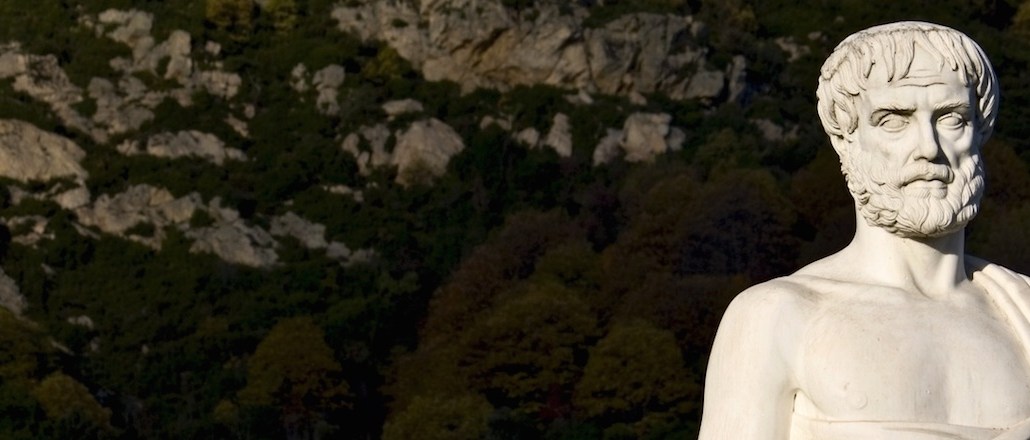Secure your place at the Digiday Media Buying Summit in Nashville, March 2-4
Aristotle shrugged: The philosopher’s case against ‘first-mover advantage’

As copy editor for Digiday and as an English professor with no experience in the world of digital media, I read stories differently than most readers of the site. When I read, for example, about a company’s “first mover advantage,” my brow furrows over the missing hyphen and I barely register what that advantage really is.
Also, I am not a native speaker of the idiom of advertising and ad tech. When I encounter terms of art like “buy side,” “click-through rates” or “space,” I tend to take the words literally and miss the intended meaning, which often leads to colorful and far-fetched interpretations.
So, last month, when I read the following sentence in Digiday, I was flummoxed:
“That said, others see an advantage in being a first mover in the bot space.”
To most readers of Digiday, I imagine, this sentence is unremarkable, especially when read in the context of a story about publishers’ reluctance to commit to developing and implementing chatbots. But to me, I found great delight in conjuring images of “bot space,” which is chock full of threatening planetary orbits and alien intergalactic travelers. And then, just who might be the first mover in this bot space?
A Google search led me to Investopedia, which taught me:
“A first mover is a form of competitive advantage that a company earns by being the first to enter a specific market or industry. Being the first allows a company to acquire superior brand recognition and customer loyalty. The company also has more time to perfect its product or service.”
It turns out there’s a fair amount of debate about whether a company actually benefits from being the first to enter a market. Adam Grant, author of “Originals: How Non-Conformists Move the World,” said in an interview with TechCrunch, ”With most products and industries, the settlers enjoy more success than the pioneers because the pioneers have to fight an uphill battle to create the market, whereas the second or third movers have to make the product better.”
And the debate goes on.
What the image of the “first mover in the bot space” does, however, is to prompt us to think about where this idea of the first mover comes from. As luck would have it, it comes from space, as in outer space. In the fourth century BCE, Aristotle argued that motion has to come from somewhere. If that is the case, then something must have sparked the first motion, and so he arrives at his theory of the first mover. Since everything in the world consists of matter and, therefore, of motion, Aristotle locates the first mover in the distant reaches of the celestial spheres.
Good polytheist that Aristotle was, he was reluctant to peg the first mover as a god. A millennium and a half later, however, St. Thomas Aquinas was eager to pin down Aristotle’s eternal, celestial force: “There must be must be a first mover existing above all – and this we call God.”
If we don our Thomist cowls and understand the first mover to be God, then our reading of Digiday’s coverage of first-mover debates changes considerably. Last week, it was reported that “since videos are a new addition to the carousel format, brands are jumping on it to be first movers.”
As far as startling imagery goes, St. Thomas’ God on a carousel rivals bots in space.
Aristotle, alas, had little to say about marketing, but he would have had his doubts about brands’ efforts to become first movers, and not merely because such attempts smack of hubris. He believed that everything has an essence, which, through virtuous living, becomes fully itself. Therefore, he says a horse achieves excellence when it does what a horse does. A plant excels in growing and blossoming according to its essence. Human beings achieve excellence in living according to what is most proper to them, namely, rationality.
As the poet Gerard Manley Hopkins wrote,
Each mortal thing does one thing and the same:
Deals out that being indoors each one dwells;
Selves — goes itself; myself it speaks and spells,
Crying Whát I dó is me: for that I came.
If a person or a thing strays from its essence, it founders.
The warning from Aristotle for a company that wants to be a first mover is that it may be drifting from excellence, which is to be found in the essence of the company. Excellence is to be found not out in bot space but in the self, or in what marketers like to call a business’s core strength.
More in Marketing

Pitch deck: Why Amazon believes its premium streaming inventory is worth the money
Amazon is pitching its DSP to make the case.

In Graphic Detail: The state of the marketing agency sector
Revenue figures from Omnicom, Publicis and Havas, and new employment stats, offer a snapshot on a quickly evolving industry.

Future of Marketing Briefing: The mental gymnastics of principal media
Welcome to the psychological CrossFit class of modern marketing. Here’s how marketers are learning to move through it.





